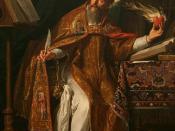1. The Council of Ephesus- Condemned and teaching that would split Christ into two persons (Jesus is one person; a divine person with two natures-divine and human).
2. Caesropapism- supreme power over both Church and state is in the hands of a lay ruler.
3. Edit of Milan- the proclamation of 312 granting toleration to all Christians.
4. The Council of Chalcedon- put the finishing touches on the Church's teachings by declaring that Jesus in divine and human natures were united in one divine person.
5. The Council of Constantinople- gave final form to a Creed we proclaim at Mass.
6. The Council of Nicea- the first economical council and condemned the teachings of Aries. This said that Jesus was only human.
7. Monasticism- the practice of men and women living in Monastery who wanted to dedicate their lives to worshipping God and lived the Christian life more fully (living alone from the world).
8. Counciliarism- general councils have supreme authority in the Church (even high authority than the pope) of the faith.
9. Heresy- beliefs contrary to some essential belief.
10. Apostolic Fathers- the Church Fathers who wrote works defending the faith.
11. St. Augustine of Hippo- struggled with temptation, finally becoming a great companion of Christianity.
12. St. Augustine of Canto- Christianized England- helped convert the Anglo-Saxons.
13. St. Ambrose- an experienced governor and administrator who reluctantly became Bishop of Milan. His preaching and teaching inspired a confused Augustine into becoming a Christian.
14. St. Boniface- converted the people in Germany.
15. St. Ansgar- converted the people of Scandinavia.
16. St. Cyril and St. Methoduis- converted the people of Eastern Europe (Slavs).
17. St. Benedict- Father of Monasticism in the west- his monastic rule was "work and prayer."
18. St. Gregory the Great- "Servant of the Servants...


